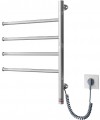The maximum power consumed when operating an electric towel rail (or combined model when operating from an electrical grid; see «Type»). As a rule, this value corresponds to the operating thermal capacity of the electric heater, so that it is possible to estimate the overall efficiency of such devices from the power consumption. In addition, energy consumption and network load depend on this indicator.
As a rule, manufacturers select the power consumption depending on the size of the towel bar - to ensure it is sufficient for heating and effective drying. This requires relatively little energy. But in the role of a heater for the bathroom is more convenient to use water heaters - they are easier to achieve high power (and such heating is cheaper). Therefore, electric heaters in modern models have low power - the devices
more than 150 W are rare, and the most low-power devices do not reach
and 50 W.
Number of jumpers - horizontal elements - provided in the design of the towel rail. It is on them are placed towels and other things designed to dry; however, there are models in which not every jumper is suitable for this. The fact is that horizontal elements can be placed in groups, inside which the distance between them is so small that it is very difficult, if not impossible, to place a towel there. In such groups, only the upper bridge supports, and the rest play the role of additional heating elements, increasing the heating area and, accordingly, the efficiency of drying the fabric. This feature is quite common in models with more than 10 jumpers.
It can be said that, in theory, the more jumpers - the more things can be hung on the towel rail; however, in practice, this moment largely depends on the design of a particular model, And the more horizontal elements there are, the more likely they are to be grouped. Also, it is worth paying attention to the width of the towel rail, according to this criterion you can conventionally divide them into
broad and
narrow.

